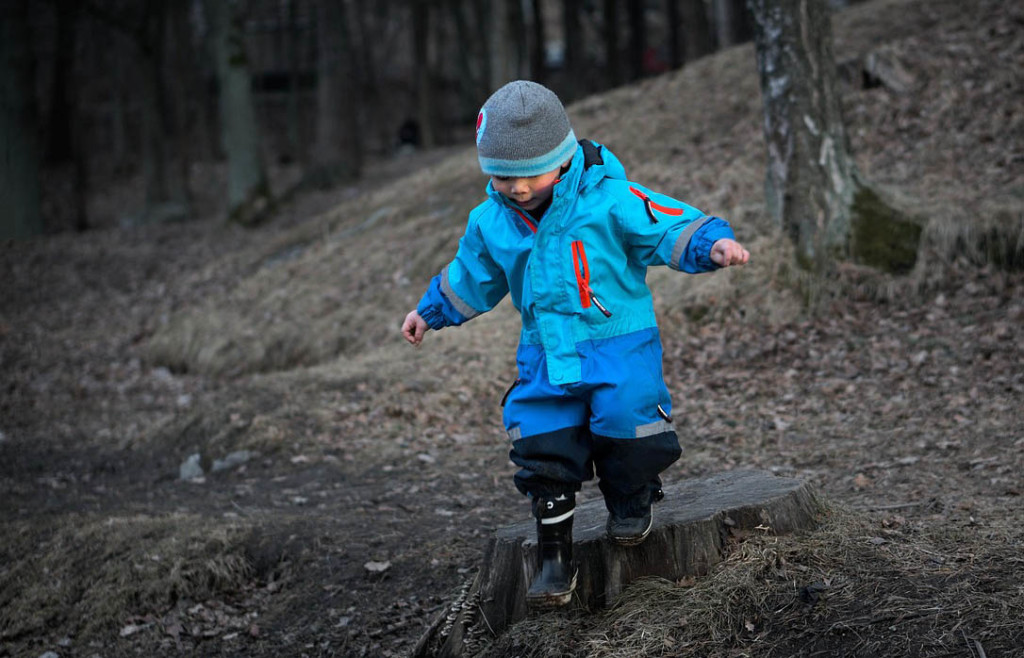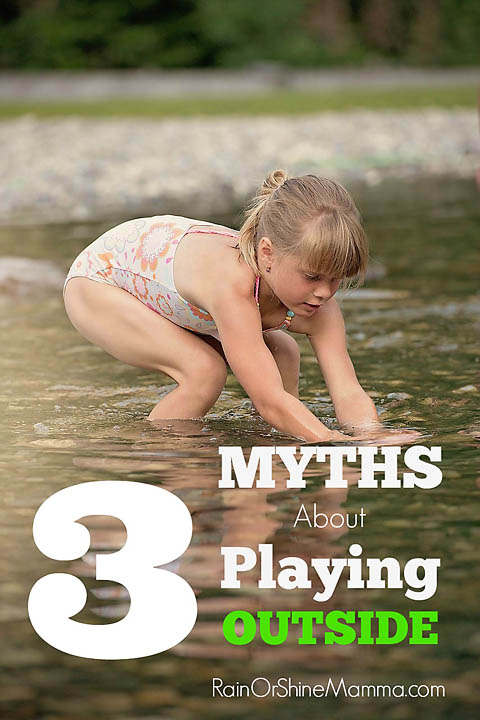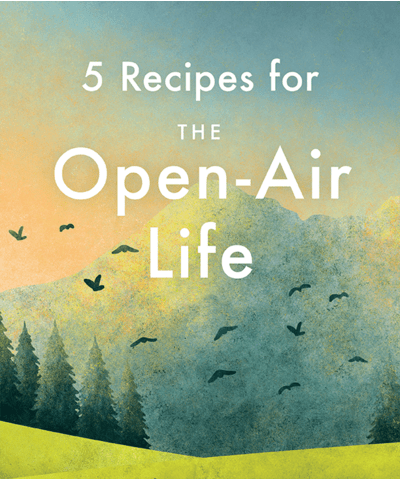When it comes to our children’s health, us parents are prone to worry and I’ve found that there are many misunderstandings and myths about playing outside. Have you heard these three common myths?

MYTH: If your child has a fever, he or she needs to stay inside
TRUTH: Being outdoors has no effect on fever
Fever is one of those things that many parents get worked up about and go to great lengths to suppress, when in fact fever helps your child’s body fight the infection. Andy Adesman, pediatrician and author of the book Babyfacts, says that “…children can have a fever as high as 105 degrees without serious risk of harm…those with a low-grade fever can go outside and play if they feel like it.”
If your child is too sick to get out of bed, by all means let her stay there. But a lot of times even kids with a fever get restless and want to get up and play. If that’s the case, there is no harm in letting them go outside, as long as they’re comfortable. Fresh air doesn’t cure illness, but it may help your child get some rest, as a lot of children nap well outside.
MYTH: You need to wait half an hour after eating before going swimming
TRUTH: There is no documented case of drowning due to a full stomach
My parents always told me to hold off on swimming for at least half an hour after eating, or I would run the risk of drowning due to cramping. Chances are you heard it from yours too. This is so universally accepted that I just found out a couple of years ago that it’s actually a myth. Although children (and adults) theoretically could develop a cramp while swimming on a full stomach, this is not known to ever have caused a drowning. You might be more comfortable if you hold off on plunging into the water after a big meal before – my mom still tells me that the body needs rest in order to digest the food properly – but it’s not dangerous not to.
MYTH: Taking your child outside in cold or windy weather can cause an ear infection
TRUTH: Bacteria and viruses cause ear infections
What myths about playing outside do you know? Please share in the comments!
Disclaimer: Please note that I’m not a doctor and not attempting to give advice about your children’s health care. You can read my full disclosure policy here.



Love this! End of the day, having kids outside is always better than keeping them in!
My thoughts exactly!
Beautiful! We can all agree kids sleep better after a day outdoors, so absolutely let them go out if they feel up to it, and they’re dressed properly!
My Grammy still thinks if you go outside with damp hair you will catch a cold.:)
She’s not the only one:o)
I love this blog! Thank you for posting all these great tips and personal anecdotes!
After reading this one, I’m curious about the approach to discipline you (and others) use- like how it is applied and how it works in real situations, especially with young kiddos (like, say, wonderfully stubborn and active 3 year old boys…just hypothetically)? Ive been trying to be creative with my Almost 3 year old, but most efforts to dissuade bad behavior and encourage listening just seem ineffective. My boy is pretty energetic and, like any kid, wants to touch and throw and hit everything (not aggressively, just enthusiastically) Trying to reason with him as to why he can’t touch the pots on the stove when mommy is cooking, or toss items into his baby brother’s crib doesn’t always produce results- “time-outs”, taking items away, and even distraction are largely ineffective, most days. What kinds of solutions have worked for people? I like the concept, but I only ever hear and read vague descriptions of this in practice, or solutions that apply to older kids, not relateable examples for the youngest bunch.
It may be too off topic (or too much of an undertaking) but if you were to do a post on that, that would be amazing! Honestly! I’m not creative in that way, but I want to be more like the kind of parent described here!
Hi Ashlee! I’m glad to hear that you’re enjoying the blog:o) As far as discipline goes, it’s been really interesting for me to learn about the vastly different parenting styles here in the US, because in Scandinavia it seems like there is much less variation. Gentle parenting is completely dominating, partly I think because spanking is banned, and many parents even consider time-outs too harsh. Since that’s the tradition I come from, that’s largely how I’ve raised my girls too, but it was never a conscious choice I made, it’s just how I was raised and how everybody I know “back home” raises their kids. I think a big difference in US and Scandinavian parenting is that here there is a higher expectation and social pressure on younger children to behave in certain (adult-approved) ways, whereas in Scandinavia, the tendency is to reframe the situation from the child’s perspective and with the child’s developmental level taken into consideration. I know this may not be the practical solutions that you’re looking for, but for more of that I highly recommend the book “The Danish Way” by Joelle Alexander (aff. link: http://amzn.to/2mjNs6q). It delves deep into the Scandinavian approach to parenting and discipline, and has opened up a whole new world to a lot of parents all over the world.